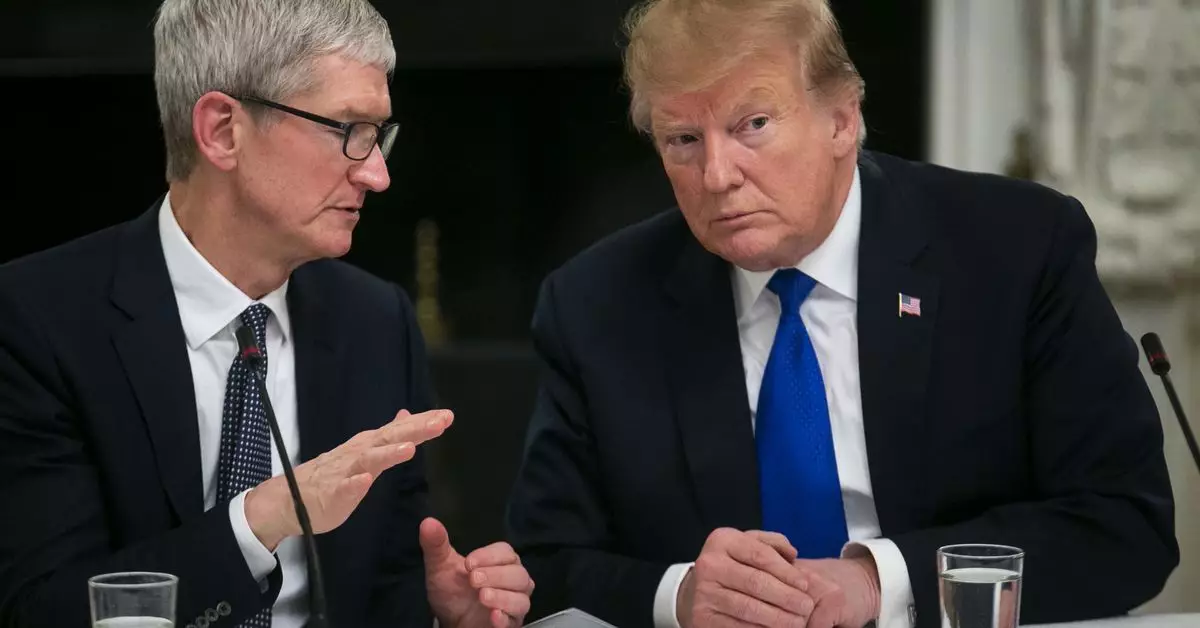In today’s rapidly evolving tech landscape, corporate leaders must often navigate political waters to safeguard their interests. Tim Cook’s forthcoming dinner with President-elect Donald Trump at the Mar-a-Lago resort serves as a paramount example of this delicate balancing act. As the CEO of Apple, Cook’s role in this engagement reflects not merely a personal connection but a strategic business maneuver that could have significant implications for Apple’s future operations amid a turbulent political climate.
Cook’s relationship with Trump began over his first term in office, establishing a dynamic that many in the tech industry now seek to emulate. The dinner represents not only a catch-up between two influential figures but also serves as an opportunity for Cook to directly articulate Apple’s position and concerns regarding upcoming tariffs and regulatory scrutiny. The significance of such direct liaisons cannot be overstated; having an open line of communication with the presidency allows corporate giants like Apple to influence policy in a way that aligns with their business models.
Among the numerous topics that may arise during their discussion, tariffs will likely take precedence. Potential increases in tariffs pose a significant threat to Apple’s globally integrated supply chain and pricing strategy. Tariffs on components or finished products could lead to price hikes that might alienate consumers, making it critical for Cook to address and alleviate potential disturbances with the incoming administration directly.
Moreover, Cook may raise concerns regarding the European Union’s ongoing actions against Apple, which have been framed under allegations of anti-competitive practices. The fines and regulatory pressures stemming from these accusations have piqued Cook’s interest, reportedly calling Trump during the campaign to express these concerns. Thus, educating Trump on the challenges Apple faces in Europe could pave the way for seeking favor or intervention from the U.S. government where appropriate.
Cook’s dinner with Trump follows other notable meetings with tech leaders, suggesting a pattern where significant federal engagement with the tech sector is increasingly vital as political alliances shift. There’s a palpable urgency among these executives to secure their interests as they navigate the complexities of governmental policy, regulatory questions, and the competitive landscape. For example, discussions with Sundar Pichai of Google and Jeff Bezos of Amazon indicate a broader trend of tech giants proactively seeking collaborative engagement rather than reactive stances.
Furthermore, the willingness of tech magnates to make substantial financial contributions to inauguration funds showcases an investment in political capital that could yield lucrative returns in the form of favorable policies. This blend of philanthropy and lobbyist motives highlights the intertwined nature of politics and corporate strategy in the modern age.
Tim Cook’s dinner with Trump symbolizes a critical intersection of business strategy and political navigation. As corporate leaders like Cook engage with government officials, the outcomes of these discussions will undeniably reverberate across the sector, influencing everything from consumer products to international trade dynamics. The strategic necessity of such meetings speaks to the broader landscape of technology-driven corporate governance and the vital importance of ensuring that the interests of the tech sector are represented at the highest levels of government. As the world watches, the results of these dialogues will undoubtedly sculpt the future of the tech industry.

